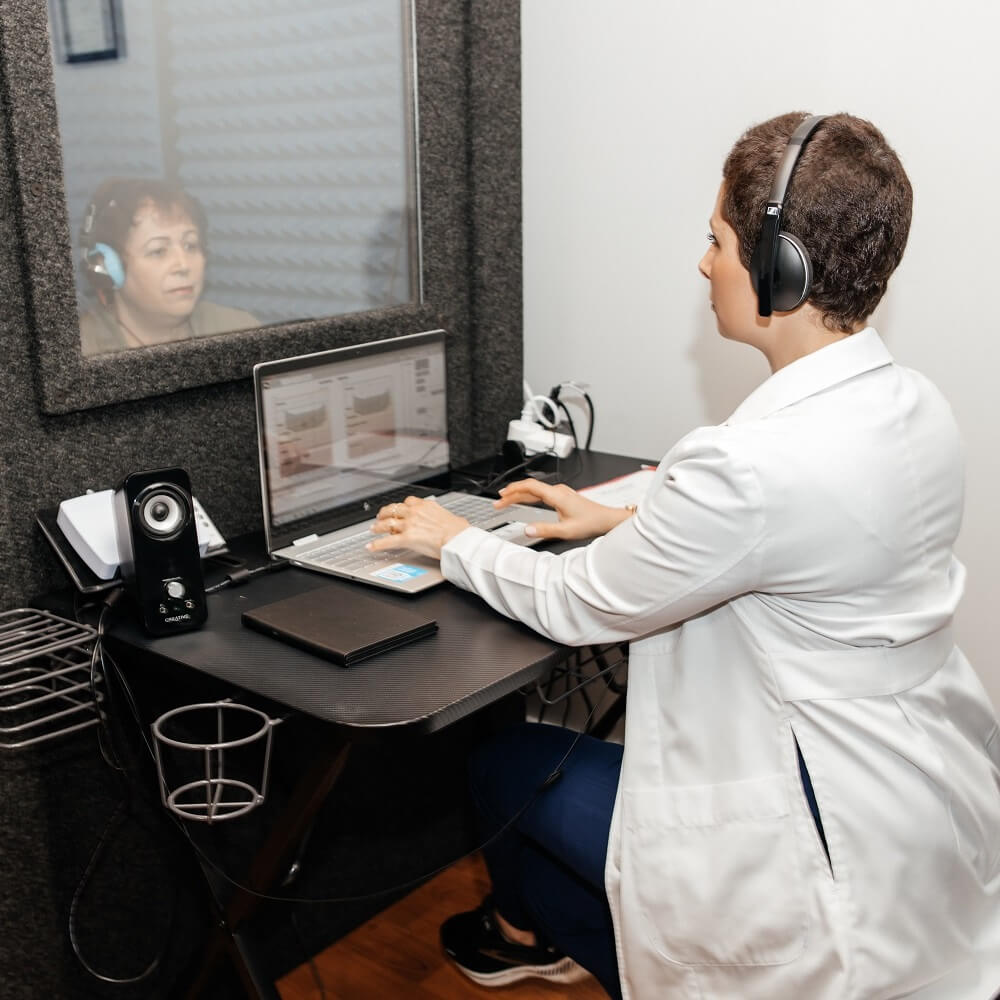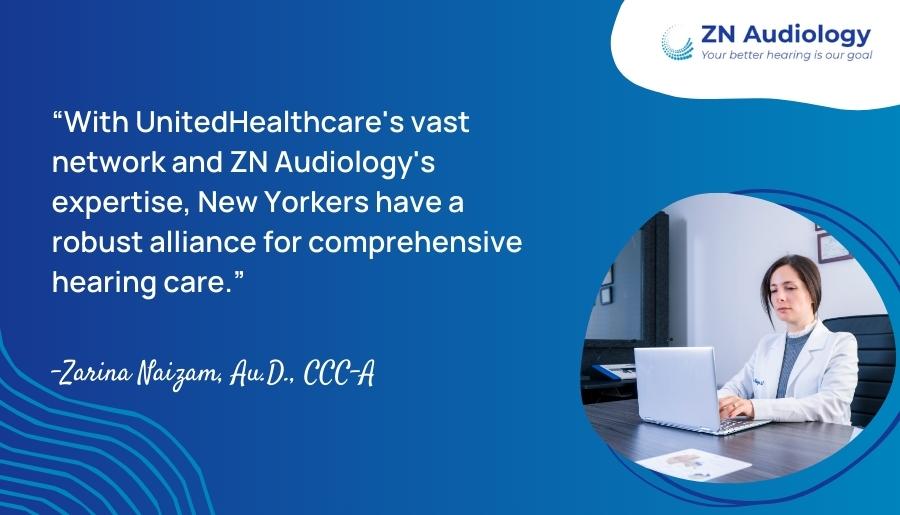Comprehensive Hearing Assessments and Diagnostic Testing in Brooklyn, NYC
Many people fail to recognize hearing loss because it comes on so slowly and they gradually adapt to the subtle changes in their hearing ability over time. In fact, about 68 percent of those with an audiometric hearing loss don’t notice any hearing difficulty, which means that most individuals with a hearing impairment wait about seven years before seeking help.
Many healthcare professionals urge their patients to make hearing tests a routine part of their overall healthcare, much like regular vision exams and dental checkups, because not addressing hearing loss can have extensive negative mental and physical health consequences, including depression, anxiety, balance disorders, cognitive decline, and more.
Early diagnosis of hearing loss allows you and your audiologist to explore a broader range of options to ensure that you hear your best for as long as possible. That’s why ZN Audiology recommends regular hearing assessments and diagnostic testing for those who suspect hearing loss.
Best of all, our comprehensive hearing exams are quick, painless, and provide immediate results.

Basics of Hearing and Hearing Loss
-
 Sound waves are received in the ear canal and travel to the eardrum, causing it to vibrate.
Sound waves are received in the ear canal and travel to the eardrum, causing it to vibrate.
-
 The vibrations from your eardrum are detected by the ossicles (tiny bones in your middle ear).
The vibrations from your eardrum are detected by the ossicles (tiny bones in your middle ear).
-
 The ossicles transfer the vibrations to the cochlea, which is a spiral cavity lined with tiny hair cells in the inner ear.
The ossicles transfer the vibrations to the cochlea, which is a spiral cavity lined with tiny hair cells in the inner ear.
-
 The hair cells receive the vibrations and send sound signals to your brain via the auditory nerve.
The hair cells receive the vibrations and send sound signals to your brain via the auditory nerve.
-
 The brain receives the sound signals and translates them into meaningful sounds.
The brain receives the sound signals and translates them into meaningful sounds.
Several conditions can disrupt or limit the effectiveness of the hearing process, such as:
-
 Aging. Known as presbycusis, deterioration of the hair cells in the cochlea is the most common cause of age-related hearing loss, but other components along the hearing pathway can also be compromised as you age.
Aging. Known as presbycusis, deterioration of the hair cells in the cochlea is the most common cause of age-related hearing loss, but other components along the hearing pathway can also be compromised as you age.
-
 Ear Trauma. A blow to the ear or the head can cause fractures in the ear or cause damage to the middle and inner ear components or the auditory nerve.
Ear Trauma. A blow to the ear or the head can cause fractures in the ear or cause damage to the middle and inner ear components or the auditory nerve.
-
 Disease. Cardiovascular diseases and diabetes can contribute to a decreased blood supply to your ears and your auditory system, while infection, swelling, and growths along the hearing pathway can disrupt the process.
Disease. Cardiovascular diseases and diabetes can contribute to a decreased blood supply to your ears and your auditory system, while infection, swelling, and growths along the hearing pathway can disrupt the process.
-
 Medication. The hearing capacity of some individuals is damaged due to the use of certain medications, known as ototoxic medications, such as cancer treatment drugs.
Medication. The hearing capacity of some individuals is damaged due to the use of certain medications, known as ototoxic medications, such as cancer treatment drugs.
-
 Noise Exposure. Ongoing exposure to loud noise can lead to noise-induced hearing loss (NIHL), which over time damages the hair cells in the inner ear. This type of hearing loss is 100 percent preventable by using proper hearing protection.
Noise Exposure. Ongoing exposure to loud noise can lead to noise-induced hearing loss (NIHL), which over time damages the hair cells in the inner ear. This type of hearing loss is 100 percent preventable by using proper hearing protection.
-
 Earwax. Known as cerumen, earwax is the body’s way of cleaning the ears and preventing infections, but if it gets built up and/or becomes impacted, it can dampen the intensity of the sounds entering your ears and prevent them from reaching the middle and inner ear. Professional earwax removal can help restore hearing in these instances.
Earwax. Known as cerumen, earwax is the body’s way of cleaning the ears and preventing infections, but if it gets built up and/or becomes impacted, it can dampen the intensity of the sounds entering your ears and prevent them from reaching the middle and inner ear. Professional earwax removal can help restore hearing in these instances.
Frequently Asked Questions About Hearing Evaluations
What is an audiological evaluation?
Audiological evaluations are the means by which doctors of audiology diagnose the type and severity of hearing loss. A full hearing evaluation performed by a licensed hearing care provider also helps the audiologist determine the correct approach for treating the hearing loss of the individual and/or provides a baseline against which future changes are measured.
How do I know if I am experiencing a hearing loss?
You could have a hearing impairment if you are experiencing one or several of the most common signs of hearing loss:
- Turning up the volume of the TV to levels that are uncomfortable to those around you
- Struggling to understand conversations on the phone
- Frequently asking others to repeat themselves
- Receiving complaints from friends or family members
- Avoiding social events and family gatherings
- Laughing at jokes to try to cover up that you can't understand them
- Experiencing aural fullness, or a feeling of stuffiness in your ears
- Experiencing ringing in your ears, or tinnitus
Are there different types of hearing loss?
Yes. A hearing evaluation can help identify any of three types of hearing loss, including:
- Conductive (which occurs when sound waves cannot travel normally through the ear)
- Sensorineural (which is caused by damage to the inner ear or the nerve from the ear to the brain)
- Mixed (which is a combination of conductive and sensorineural hearing loss)
What tests are used during a hearing evaluation?
The specific tests used during a hearing assessment will depend on the age and circumstance surrounding the individual’s hearing impairment. Tests used can include:
- Pure Tone—you listen to various tones transmitted through headphones and respond to those you hear
- Bone Conduction—a vibrator behind the ear sends tones directly to the hearing organs of the inner ear, bypassing the outer and middle ear
- Tympanometry—assesses the condition of the middle ear components, like the eardrum and the three small connecting bones
- Speech Reception—is similar to the pure tone test but uses spoken words
- Sentence-in-Noise (SIN)—evaluates your ability to understand conversational speech in noisy environments
- Otoacoustic Emissions—measures the response of the hair cells in the inner ear
- Auditory Brainstem Response— often used to test the hearing of infants and young children, as well as individuals experiencing auditory processing disorder (APD)
ZN Audiology’s 7-Step Comprehensive Hearing Evaluation Process
Case History
At the start of your appointment with Dr. Zarina Naizam, she will ask you questions to better understand your hearing and overall health. She will ask about any medications you are taking, past surgeries, and family history of hearing loss. She will also ask about your lifestyle, such as exposure to loud noises or recreational activities that may put you at risk for hearing loss.
Physical Evaluation
Dr. Naizam will use a video otoscope to examine your ear and look for any abnormalities, such as impacted cerumen or signs of infection.
Tympanometry
The next part of the evaluation involves a test of the middle ear, known as tympanometry.
Dr. Naizam will insert a probe into your ear canal, and pressure changes will be introduced. The probe will measure the movement of the eardrum in response to these changes in pressure. The test is not invasive and doesn't involve any pain or discomfort.
Pure-Tone Testing
This test evaluates your ability to hear different tones and sounds. Dr. Naizam will use an audiometer, which produces different frequencies and volumes of sound. You will wear headphones and be asked to respond when you hear a sound.
Speech Testing
Another test that will allow Dr. Naizam to evaluate your hearing is a speech test. This test involves you listening to a series of spoken words at different volumes and repeating them back to Dr. Naizam. If hearing loss is observed, a speech-in-noise test will be conducted to evaluate your ability to hear and understand speech in noisy environments.
Audiogram
The results of the audiometric evaluation will be plotted on a graph called an audiogram, which shows your hearing thresholds at different frequencies. This information is used to diagnose the type and severity of hearing loss, if present.
Discussion of Results and Options
Depending on the outcome of your hearing evaluation, Dr. Naizam will walk you through your results, explain what they mean and, if required, discuss your potential treatment options.
With early detection and intervention preventing many negative consequences of hearing loss, such as cognitive decline, social isolation, and depression, she’ll be able to help make the best recommendation for your long-term hearing health.
Schedule a Hearing Evaluation
Recognizing that you are experiencing hearing challenges can be difficult because the changes come on at such a slow pace. Consequently, the best way to know the truth about your hearing and get the help you need is by having a hearing assessment.
Both of ZN Audiology’s clinics in Forest Hills and Brooklyn, NYC are able to provide comprehensive diagnostic hearing evaluations to help determine the type and severity of your hearing loss. Get started on the road to better hearing today by contacting us to schedule a hearing evaluation using the button below.




